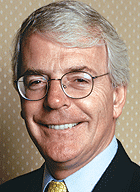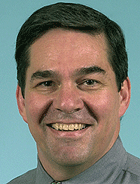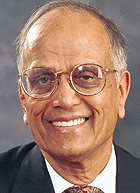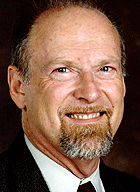The Right Honourable Sir John Major, former prime minister of Great Britain and Northern Ireland and a leading authority on globalization, will give the keynote address for the Founders Day celebration Nov. 4.
The annual event, sponsored by the Alumni Association, commemorates the founding of Washington University in 1853 and presents distinguished faculty and alumni awards. In addition, the Board of Trustees will bestow the Robert S. Brookings Award to persons who have shown extraordinary commitment to building bridges between WUSTL and the St. Louis region.

Tickets are available to the WUSTL community and alumni for the celebration, which will be held at the Adam’s Mark Hotel, beginning at 6:30 p.m. For reservations, contact the Alumni Relations Office at 935-6503.
One of the most distinguished figures in the international arena, Major was instrumental in negotiating a lasting peace in Northern Ireland.
During his seven years as prime minister, he instituted public sector reforms that were widely modeled and helped create the strongest economy Britain had experienced in recent decades.
Major entered British politics when he was elected to Parliament in 1979.
His next post was a jump to Margaret Thatcher’s cabinet when he was appointed chief secretary to the treasury, foreign secretary and chancellor of the exchquer, successively. In 1990, he became prime minister.
Since leaving the British Parliament in 2001, Major has returned to the private sector for a number of companies. In addition, he assists several charitable organizations, including Asthma UK, the Prostate Cancer Charity, Sightsavers UK and Mercy Ships. He is also the author of John Major: The Autobiography.
Among his most prestigious awards are two bestowed by HM The Queen Elizabeth: The Companions of Honour, given in 1999 in recognition of his role in the Northern Ireland peace process; and The Order of the Garter, England’s highest award for chivalry, in 2005.
After Major’s speech, four faculty members will be honored for their outstanding commitment and dedication to the intellectual and personal development of students.
They are D.B. Dowd, professor of visual communications, Sam Fox School of Design & Visual Arts; Bradley Evanoff, M.D., the Richard and Elizabeth Henby Sutter Associate Professor of Occupational, Industrial and Environmental Medicine; Shanti K. Khinduka, Ph.D., the George Warren Brown Distinguished University Professor, George Warren Brown School of Social Work; and David A. Peters, Ph.D., the McDonnell Douglas Professor of Engineering, School of Engineering & Applied Science.
Receiving this year’s Distinguished Alumni Awards are: Jon H. Feltheimer (LA52), co-chair and chief executive officer of Lionsgate Entertainment; Marylen Mann (LA57, GR59), chair and founder of The Oasis Institute; Gordon W. Philpott (MD61), professor emeritus of surgery in the School of Medicine; James E. Shiele (LA52, GR85), former chair of St. Louis Screw & Bolt Co.; James D. Weddle (GB77), managing partner, Edward Jones; and George Zimmer (LA70), chair and chief executive officer, Men’s Wearhouse Inc. (The alumni awardees, as well as the Brookings honorees, will be featured in the Nov. 2 edition of the Record.)
Since 1992, when D. B. Dowd joined the faculty as director of the Core program in what was then known as the School of Art, he has been instrumental in advancing and expanding the school’s curriculum, programs and technological initiatives.

Exploring the creative realm of the popular image, Dowd has achieved success as an illustrator, animator, writer and creative director. His illustrated books and fine prints hang in many American museums, most notably, the Whitney Museum of American Art, the Fogg Art Museum at Harvard University and the National Gallery of Art in Washington, D.C.
He has produced editorial illustrations for The New York Times op-ed page, the Wall Street Journal and The New Yorker. His popular illustrated satire “Sam the Dog” ran for 108 weeks in the St. Louis Post-Dispatch. Dowd also produces animated film and pictorial information design at his Ulcer City Studio in St. Louis.
His contributions at the Sam Fox School include playing a key role in the creation of the Nancy Spirtas Kranzberg Book Studio and leading the transition from a print-based curriculum to one stressing both print and digital multimedia and also from an emphasis on traditionally oriented specializations to a synthetic model for portfolio development.
In addition, Dowd leads the motion design group for seniors and works with junior illustrators and designers. Most recently, he launched the Visual Communications Research Studio, a group engaged in design projects with University partners.
For the Sam Fox School and University Libraries, Dowd has lent his expertise to attract significant collections of American illustrations.
In 2003, Dowd created The History of Illustrated Entertainment, a survey of pictorial graphic culture covering caricature, comics, books and periodical illustration, animation and pictorial information design. He has curated a number of exhibitions and has written on the history of visual culture.
He earned a bachelor’s degree in history from Kenyon College in 1983 and a master of fine arts from the University of Nebraska in 1989.
As a student at Cornell University, Bradley Evanoff found a deep interest in environmental and occupational health. After graduating from WUSTL’s School of Medicine in 1986, he completed a residency in internal medicine here, serving as medical chief resident at St. Louis Veterans Administration Hospital.

Postdoctoral fellowships followed, but Evanoff decided to pursue his earlier passion and earned a master’s degree in public health from WUSTL in 1993. One year later, he established a research program in occupational and environmental medicine in the School of Medicine. Since 1998, he also has led the Division of General Medical Sciences.
His work contributes to the advancement of a great number of wide-reaching health issues. These include the epidemiology and prevention of work-related musculoskeletal disorders, the examination of health problems in health-care workers and the evaluation of prevention programs. Evanoff’s current investigations focus on carpal tunnel syndrome and lower extremity pain, as well as evaluation of programs to reduce falls by carpenters.
His teaching also covers preventive medicine and public health. He has been a valuable adviser and mentor to students and serves as faculty sponsor for the school’s weeklong orientation in public health and community medicine for first-year medical students. These contributions have been acknowledged with four teaching awards.
Most recently, Evanoff led in the development of new pre- and postdoctoral clinical research training programs. He also directs the master’s degree program in clinical investigation at the School of Medicine.
Evanoff has been recognized in his profession with a Fogarty fellowship at the Swedish National Institute of Occupational Health, in Stockholm, Sweden, and as a Robert Wood Johnson Clinical Scholar at the University of Washington. This year, he received the Bernice Owen Award for Research, which honors a person who has made significant contributions to preventing injuries in health-care workers, and the National Occupational Research Agenda Partnering Award for Worker Health and Safety.
When Shanti K. Khinduka retired in 2004 as dean of the George Warren Brown School of Social Work, he left it with an international reputation that is renowned for social work education and research.

One of the hallmarks of his tenure, which spanned three decades, was forging new alliances with other schools at WUSTL to tackle social problems that required a multidisciplinary approach. As a professor, he continues to have a positive impact on the school and its students.
Khinduka has made a major impact on his profession as well. His research has been published worldwide in journals on technical assistance, community and social development and international social welfare. He has edited three books and founded the Journal of Social Service Research in 1977.
Khinduka serves on the editorial board for the Encyclopedia of Social Work (20th ed.) due for publication in 2007. Active in his profession, he has served on or chaired many boards and committees of the National Association of Social Workers, the National Conference on Social Welfare, the Council on Social Work Education, the National Association of Deans and Directors of Social Work Schools and the Institute for the Advancement of Social Work Research. From 2001-05, he led the Inter-university Consortium for International Social Development.
Among his many professional and association honors are the President’s Award for Educational Excellence, the Significant Lifetime Achievement Award, the Outstanding Social Work Educator and Scholar Award and the Los Amigos de la Humanidad Distinguished Educator Award.
Born in Jaipur, India, he earned a bachelor’s degree from Rajasthan University in 1953, two master of social work degrees — one from Lucknow University (also in India) in 1955 and one from the University of Southern California in 1961.
A doctorate in social welfare followed from Brandeis University in 1968.
David A. Peters has spent most of his professional life at WUSTL, and has been contributing to aeronautics and astronautics research, education and practice since 1969, when he earned a bachelor’s degree in applied mechanics from WUSTL and joined the McDonnell Douglas Corp.

Soon after, Peters joined the U.S. Army Research Laboratory at NASA’s Ames Research Center, concentrating on helicopter dynamics and aerodynamics. In 1975, he returned to the University and joined the Department of Mechanical and Aerospace Engineering in the School of Engineering & Applied Science. In 1982, after promotion to full professor, he became department chair.
A few years later, Peters joined the Georgia Institute of Technology faculty as a professor of aerospace engineering, where he founded the Georgia Tech Space Grant Consortium.
Although he returned to WUSTL in 1991, he has continued his association with Georgia Tech. During this second tenure, Peters directed the Center for Computational Mechanics and served a second term as department chair. Currently, Peters is the associate director of the Georgia Tech/Washington University Center of Excellence for Rotorcraft Technology, in addition to being the inaugural McDonnell Douglas Professor of Engineering.
Widely recognized as an expert in design and analysis of rotary-wing aircraft, Peters’ theory of dynamic inflow is the world standard for wake modeling in rotocraft dynamics and simulation.
He has served as a consultant for The Boeing Co., McDonnell Douglas, Bell, Sikorsky, Kaman and many other aerospace companies.
He has published more than 200 refereed papers and has advised the National Research Council and the U.S. Congress.
For his far-ranging contributions to his field, Peters has received numerous professional awards, including two from NASA, and two teaching awards, one from WUSTL students who chose him as the School of Engineering Professor of the Year.
Peters earned a master’s degree in applied mechanics from WUSTL and a doctoral degree from Stanford University.